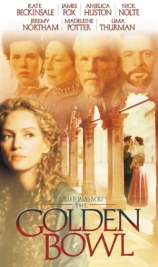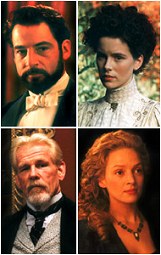| The Golden Bowl |
| |
 |
USA/France/UK, 2000. Rated R. 134 minutes.
Cast:
Jeremy Northam, Uma Thurman, Nick Nolte, Kate Beckinsale, Anjelica Houston,
Edward Fox, Madeleine Potter
Writers: Ruth Prawer Jhabvala, based on the novel by Henry James
Music: Richard Robbins
Cinematographer: Tony Pierce-Roberts
Producers: Ismail Merchant
Director: James Ivory
LINKS
|
 ow available
on DVD and video, The Golden Bowl is a Merchant/Ivory film that flew
under the radar into theaters in limited release early last summer. No one noticed.
You would think that a film by the producer/director team of Ismail Merchant
and James Ivory (A Room with a View, Howards End, The Remains of the Day)
would make more of an impression, but it was not pushed hard by its U.S. distributor,
Lions Gate Films. Upon viewing the film, it becomes apparent why. Though lavish
and well-acted, The Golden Bowl fails to generate emotional momentum
and sags under its own length.
ow available
on DVD and video, The Golden Bowl is a Merchant/Ivory film that flew
under the radar into theaters in limited release early last summer. No one noticed.
You would think that a film by the producer/director team of Ismail Merchant
and James Ivory (A Room with a View, Howards End, The Remains of the Day)
would make more of an impression, but it was not pushed hard by its U.S. distributor,
Lions Gate Films. Upon viewing the film, it becomes apparent why. Though lavish
and well-acted, The Golden Bowl fails to generate emotional momentum
and sags under its own length.
Based on a Henry James novel, The Golden Bowl goes for the same tragedy-created-by-the-inaction-imposed-by-society's-strictures
thing that Merchant/Ivory so fruitfully conveyed in The Remains of the Day
and was also effectively portrayed in movies like The Age of Innocence
and The House of Mirth. The only
bit of that feeling The Golden Bowl effectively creates is the "inaction"
part.
Set in England and Italy in the first decade of the 1900s, the story concerns
two impecunious lovers, Charlotte Stant (Uma Thurman) and Prince Amerigo (Jeremy
Northam, donning beard and Italian accent). Instead of marrying Charlotte, Amerigo
marries Charlotte's friend Maggie Verver (Kate Beckinsale) for her money. Amerigo
does genuinely care about Maggie, though, and after consulting their mutual
friend Fanny Assingham (Anjelica Huston), he chooses not to disclose to Maggie
his prior relationship with Charlotte.
In order to secure her own fortune and be near Amerigo, Charlotte immediately
latches onto Maggie's fabulously wealthy industrialist father, Adam Verver (Nick
Nolte), who spends his time buying great art in order to found a museum back
home in  New
York City (which, for some reason, is called "American City" in the story).
Soon Charlotte and the much-older Adam are married as well.
New
York City (which, for some reason, is called "American City" in the story).
Soon Charlotte and the much-older Adam are married as well.
They didn't have Days of Our Lives and The Young and the Restless
in the Edwardian era, so nobody realizes this is a Very Bad Idea. Nobody, that
is, except Amerigo, but he is prevented from saying anything because he has
already lied about not previously knowing Charlotte. Charlotte and Amerigo resist
temptation for a couple years, but adultery is inevitable. The adultery's inevitability
makes the half-movie wait extremely frustrating. There's no tension. You know
that it's inevitable, because without the adultery there is no story.
What happens after the seventh commandment is torn asunder is slightly more
intriguing. One of the main themes of The Golden Bowl is the pretense
that is required by society for the sake of others, when in fact everyone is
probably well aware of what's going on--including the people supposedly being
protected from the hurtful truth. The affair could not be more obvious--it was
obvious long before it even happened--but Maggie is so clueless that you wonder
if she's a simpleton. Then you realize that she's willfully blind, refusing
to acknowledge the truth, because it is too painful and shameful to bear. Meanwhile,
everyone assumes Adam knows nothing, even though it's entirely likely he knows
everything.
While all of this is going on, Adam remarks to Amerigo that they are two ideal
husbands. The statement is ironic not because it is false, but because it is
true. They are ideal husbands, but not to the women they have married. Amerigo
is ideal for Adam's wife, Charlotte, while Adam is ideal for Amerigo's wife,
Maggie. Maggie, having a bit of an Elektra complex, idolizes her father. Adam
and Maggie dote on each other so much that they practically throw Amerigo and
Charlotte together, repeatedly sending them out to social engagements while
they stay at home or go art hunting in each other's company. Even without knowing
of Amerigo and Charlotte's prior relationship, their stupidity is amazing. Most
of society assumes Amerigo and Charlotte are adulterers long before they actually
fall in bed together. Thus, sympathizing with Maggie and Adam is difficult.
The film is named after its central metaphor, a gorgeous crystal bowl lacquered
in gold that Charlotte and Amerigo chance upon in a shop. Amerigo talks Charlotte
out of buying it because it has a nearly invisible crack. The bowl is a symbol
for the beautiful life of leisure Adam and Maggie enjoy and Amerigo and Charlotte
desire. As a symbol, it's handled with clumsy obviousness by Ivory. The bowl
practically screams, "Look at me! I'm a metaphor!" It is, however, interesting
that only Amerigo can see the flaw, just as he is the only one who senses that
Charlotte's marriage to Adam is a Very Bad Idea. The film portrays Amerigo as
basically a decent guy, just weak. His name, handed down from his ancestor Amerigo
Vespucci, the Italian explorer who gave his name to America, is a wry joke.
Adam intends eventually to return to America with his treasures, but Charlotte
cannot bear the thought of leaving Amerigo and going off to what she views as
a grimy land of heathens.
A handful of ironies and the mystery of who-knows-what are not enough to make
The Golden Bowl fully engaging. It not only lacks suspense, The Golden
Bowl fails to provide meaningful insight into the desires and behavior of
any of the characters, except Amerigo. Emotional identification with the characters
is difficult, even though the actors do a good enough job, especially Northam.
(He's been toiling effectively in these period films for some years now, and
deserves to be given a shot at something big.) The climaxes--there are two or
three small ones--are dull and obvious, and then the film sputters to a halt.
Because this is Merchant/Ivory, the sets and costumes are extraordinary, but
draping them over such an inert script creates a stultifying effect. Ivory seems
more concerned with pretty photography than drama. The Golden Bowl is
certainly not a bad film, but it is a modest entry in the Merchant/Ivory filmography.
Review
© January 2002 by AboutFilm.Com and the author.
Images © 2001 Lions Gate Entertainment and Merchant Ivory Productions.
All Rights Reserved.

 New
York City (which, for some reason, is called "American City" in the story).
Soon Charlotte and the much-older Adam are married as well.
New
York City (which, for some reason, is called "American City" in the story).
Soon Charlotte and the much-older Adam are married as well.
